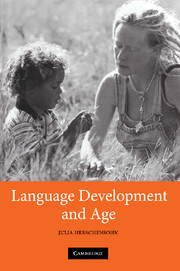Book contents
- Frontmatter
- Contents
- List of figures
- List of tables
- Preface
- Acknowledgments
- List of abbreviations
- 1 Just in time: is there a critical period for language acquisition?
- 2 Right on time: process and schedule of first language acquisition
- 3 All in good time: a window of opportunity for first language acquisition
- 4 Behind time: process and schedule of second language acquisition
- 5 Pressed for time: age constraints in second language acquisition
- 6 Biding time: further consideration of age and acquisition
- 7 It's about time: evaluation of age sensitivity in language acquisition
- Bibliography
- Index
1 - Just in time: is there a critical period for language acquisition?
Published online by Cambridge University Press: 22 September 2009
- Frontmatter
- Contents
- List of figures
- List of tables
- Preface
- Acknowledgments
- List of abbreviations
- 1 Just in time: is there a critical period for language acquisition?
- 2 Right on time: process and schedule of first language acquisition
- 3 All in good time: a window of opportunity for first language acquisition
- 4 Behind time: process and schedule of second language acquisition
- 5 Pressed for time: age constraints in second language acquisition
- 6 Biding time: further consideration of age and acquisition
- 7 It's about time: evaluation of age sensitivity in language acquisition
- Bibliography
- Index
Summary
Introduction
David Sedaris (2000, 160–161), in describing his initial experiences in French language immersion in a Normandy village, points out an age disadvantage for adults learning language: “I’d hoped that language might come on its own, the way it comes to babies, but people don’t talk to foreigners the way they talk to babies. They don’t hypnotize you with bright objects and repeat the same words over and over, handing out little treats when you finally say ‘potty’ or ‘wawa.’ … I wanted to lie in a French crib and start from scratch, learning the language from the ground floor up. I wanted to be a baby, but instead, I was an adult who talked like one, a spooky man-child demanding more than his fair share of attention.” Sedaris presents an anecdotal view of language acquisition reflecting the folk wisdom that infants learn language with apparent ease, no instruction and in very little time. Adults, on the other hand, find learning a new language to be cognitively challenging, labor-intensive and time-consuming. While Sedaris ostensibly puts forth the view of infant language acquisition as a result of positive reinforcement, he makes the reader wonder why Burgundy wine, camembert cheese and Limoges dessert plates do not constitute the “little treats” that might entice him to learn French. He also admits the social dimension of adult language learning in pointing out that the learner feels reduced to child-like behavior, while the interlocutor finds him overly demanding.
- Type
- Chapter
- Information
- Language Development and Age , pp. 1 - 26Publisher: Cambridge University PressPrint publication year: 2007



